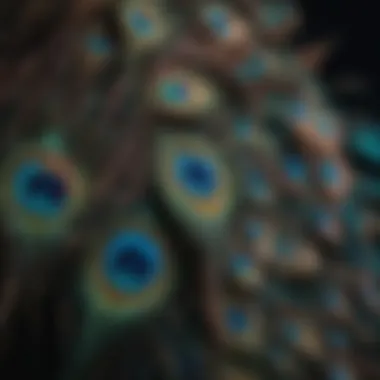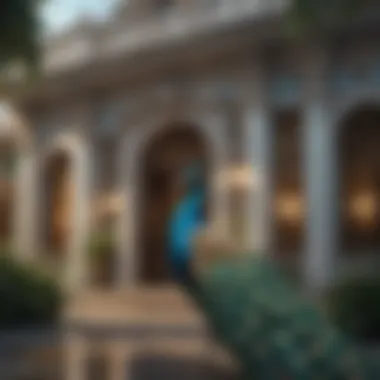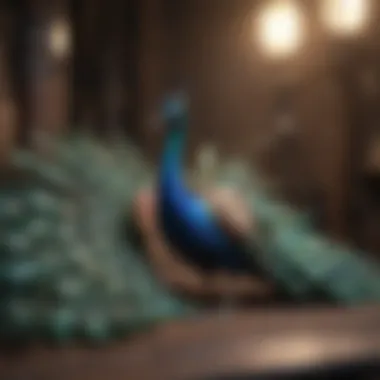Unveiling the Monthly Expenses of Peacock Ownership: A Detailed Financial Analysis


Introduction to Owning a Peacock Per Month
As we embark on the fascinating journey of exploring the financial implications of owning a peacock on a monthly basis, it is crucial to delve into the intricate details of the expenses involved in caring for these magnificent birds. From their diet and shelter to their healthcare and general maintenance, this in-depth analysis aims to provide prospective peacock owners with a comprehensive understanding of the costs associated with welcoming these regal creatures into their lives. Let us navigate through the nuances of peacock ownership and shed light on the economic responsibilities that come with such a unique and beautiful pet.
Introduction
Owning a peacock is not merely about the aesthetic appeal they bring; it is also a substantial financial commitment. This article aims to provide a detailed breakdown of the monthly expenses associated with peacock care. By exploring the costs of essentials such as food, shelter, healthcare, and upkeep, potential peacock owners can gain valuable insights to make informed decisions.
Understanding the Financial Commitment of Peacock Ownership
Initial Costs
When delving into the realm of peacock ownership, one cannot overlook the initial costs involved. These upfront expenses, including the purchase price and transportation fees, set the foundation for the financial journey ahead. The acquisition of a peacock demands a significant investment, which must be carefully considered. While transportation fees may vary, they add to the initial capital outlay.
Recurring Monthly Expenses
Beyond the initial investment, peacock ownership incurs recurring monthly expenses that play a crucial role in the long-term financial planning. From specialized peacock feed to regular supplements, ensuring proper nutrition for these regal birds comes at a price. Moreover, healthcare expenses, encompassing vaccinations, veterinary check-ups, and necessary medications, contribute significantly to the monthly outlay. Additionally, maintenance costs such as cleaning supplies and periodic repairs form part of the regular financial commitment.
Initial Costs
Ownership of a peacock comes with various financial commitments, with initial costs representing a significant aspect. Before delving into the monthly expenses, it is crucial to understand the importance of acknowledging the upfront financial outlay required when bringing a peacock into your care. Initial costs cover the expenses incurred at the beginning of ownership, including the purchase price of the peacock itself and transportation fees. These costs lay the groundwork for ongoing spending and play a vital role in shaping the overall budget for peacock ownership.


Acquiring a Peacock
Purchase Price
When considering the acquisition of a peacock, the purchase price stands out as a critical component. The cost of buying a peacock varies depending on factors such as the bird's age, species, and overall health. The purchase price not only reflects the value of the peacock but also sets the financial tone for future expenses related to its care. Potential peacock owners must carefully evaluate the purchase price, ensuring that it aligns with their budget and expectations for peacock ownership. While a higher purchase price may indicate superior quality, it is essential to balance cost with the long-term financial requirements of owning a peacock.
Transportation Fees
In addition to the purchase price, transportation fees contribute significantly to the initial costs of acquiring a peacock. Transporting a live bird safely and comfortably requires specialized handling and logistics. These fees cover the expenses associated with transporting the peacock from its place of origin to its new home. While transportation fees add to the initial financial investment, they are crucial for ensuring the well-being of the peacock during transit. Owners should factor in these costs when budgeting for the acquisition of a peacock.
SetUp Costs
Preparing for the arrival of a peacock involves investing in various setup costs to create a suitable living environment for the bird. Housing forms a critical aspect of setup costs, providing shelter and protection for the peacock against the elements. Enclosures and fencing contribute to the safety and security of the peacock, preventing potential escape and ensuring a defined living space. Perches and roosts offer elevated resting spots for the bird, mimicking its natural habitat and promoting healthy behavior. Nesting boxes provide privacy and comfort for the peacock during breeding season, encouraging natural nesting instincts. Feeding and watering stations are essential for maintaining the bird's nutritional needs, offering easy access to food and fresh water. Each component of setup costs plays a specific role in creating a conducive environment for peacock well-being.
- Housing: The housing structure serves as the primary shelter for the peacock, providing protection from weather conditions and predators. It should be spacious, well-ventilated, and easy to clean to ensure the bird's comfort and health. While investing in quality housing may incur higher initial costs, it is a long-term benefit for the well-being of the peacock.
- Enclosures and Fencing: Erecting secure enclosures and fencing around the peacock's living area is essential for its safety and security. Enclosures prevent the bird from wandering off or being exposed to potential dangers, while fencing establishes clear boundaries for the peacock's territory. Choosing durable materials and proper construction techniques ensure the effectiveness of enclosures and fencing in safeguarding the peacock.
- Perches and Roosts: Peacocks are arboreal creatures that require elevated perching spots for resting and observing their surroundings. Installing sturdy perches and roosts within the living space mimics the bird's natural habitat and promotes physical activity. Offering a variety of perch options accommodates the peacock's need for different resting heights and textures.
- Nesting Boxes: Providing suitable nesting boxes is essential for peahens to lay and brood their eggs comfortably. These boxes should be spacious, comfortable, and easily accessible for the birds to nest and care for their young. Proper placement of nesting boxes within the housing area ensures privacy and security for nesting peafowls.
- Feeding and Watering Stations: Access to nutritious food and clean water is vital for the health and vitality of peacocks. Setting up feeding and watering stations in convenient locations within the living space ensures regular access to food and hydration. Choosing appropriate feed and water containers that are easy to clean and maintain promotes good feeding habits and prevents contamination.
Recurring Monthly Expenses
In this section, we delve into the recurring monthly expenses associated with owning a peacock. Understanding the financial commitment is crucial for prospective peacock owners to make informed decisions. Recurring costs play a significant role in the overall budgeting and maintenance of these elegant birds. It is essential to consider factors such as feeding, healthcare, and general maintenance when calculating the monthly expenses of peacock ownership.
Feeding Costs
Feeding costs are a substantial part of the recurring monthly expenses for peacock owners. Specialized peacock feed is designed to meet the unique dietary requirements of these birds, ensuring optimal health and nutrition. Peacocks require a specific diet rich in nutrients and proteins to maintain their vibrant plumage and overall well-being. Investing in high-quality peacock feed is essential to support their growth and development.


- Specialized Peacock Feed: Specialized peacock feed offers a balanced blend of grains, seeds, and vitamins tailored to meet the nutritional needs of peacocks. Its formulation supports the vibrant colors of their feathers and promotes healthy feather growth. Peacock feed is a popular choice among owners due to its convenience and targeted benefits. However, the cost of specialized feed can be relatively higher compared to standard bird feed.
- Supplements: Supplements play a complementary role in enhancing the dietary intake of peacocks. They provide additional nutrients and support overall health. Incorporating supplements into the peacocks' diet can help address specific deficiencies and boost their immune system. While supplements offer benefits, it is crucial to consult a veterinarian to determine the appropriate types and quantities for optimal results.
Healthcare Expenses
Healthcare expenses are essential to ensure the well-being of peacocks. Vaccinations, veterinary check-ups, and medications are integral components of the recurring monthly costs associated with peacock ownership. Prioritizing preventive healthcare measures can help mitigate the risk of illnesses and maintain the peacocks' health and vitality.
- Vaccinations: Vaccinations are crucial for protecting peacocks against various diseases. They bolster the immune system and safeguard the birds from potential health threats. Adhering to vaccination schedules recommended by avian veterinarians is paramount in ensuring the long-term health and longevity of peacocks.
- Veterinary Check-ups: Regular veterinary check-ups are essential for monitoring the overall health status of peacocks. Veterinary examinations help detect any underlying health issues early on and enable timely interventions. Routine check-ups contribute to early disease detection and promote the well-being of the peacocks.
- Medications: Medications may be necessary to treat specific health conditions or illnesses in peacocks. Administering prescribed medications as directed by a veterinarian is crucial for effective treatment outcomes. The cost of medications should be factored into the monthly budget to address any potential healthcare needs that may arise.
Maintenance Costs
Maintenance costs encompass various expenditures associated with the upkeep of peacocks' living environment and overall well-being. Cleaning supplies and repairs are key components of maintenance expenses that peacock owners need to consider. Ensuring a clean and safe habitat for the birds is essential for their health and happiness.
- Cleaning Supplies: Cleaning supplies are essential for maintaining a hygienic living space for peacocks. Regular cleaning of enclosures, perches, and feeding stations is vital to prevent the spread of diseases and promote a healthy environment. Investing in quality cleaning supplies ensures effective sanitation practices and contributes to the overall wellness of the peacocks.
- Repairs and Upkeep: Repairs and upkeep are necessary to address wear and tear in the peacock's habitat. Regular maintenance of fencing, nesting boxes, and other structures is vital to secure the safety of the birds and prevent potential hazards. Budgeting for repairs and upkeep allows owners to promptly address any structural issues and maintain a safe living space for their peacocks.
Additional Considerations
In the realm of peacock ownership, understanding the unforeseen aspects is crucial. It is imperative to delve into the unforeseen costs that may arise beyond the typical monthly expenses. Additional considerations play a pivotal role in ensuring that peacock owners are well-prepared for any unexpected financial burdens that could potentially surface. The importance of considering emergencies such as veterinary care and unforeseen repairs cannot be overstated. By acknowledging these possibilities, owners can safeguard themselves from financial strain and better care for their magnificent avian companions.
Unexpected Costs
Emergency Veterinary Care


When it comes to owning a peacock, emergency veterinary care stands out as a critical aspect that necessitates attention. This specialized form of medical assistance is tailored to address urgent health issues that may emerge with these exotic birds. The key characteristic of emergency veterinary care lies in its swift response to sudden ailments or injuries that peacocks may encounter. Instant access to qualified professionals familiar with avian healthcare is a boon in ensuring the well-being and longevity of these unique creatures. Despite its undeniable benefits, emergency veterinary care may pose a financial challenge due to its specialized nature and the expertise required, making it a costly but indispensable choice for peacock owners.
Unforeseen Repairs
Unforeseen repairs represent another significant consideration in the realm of peacock ownership. Particularly pertinent to the maintenance of enclosures, nesting areas, and feeding stations, unforeseen repairs can arise unexpectedly and demand immediate attention. The key characteristic of unforeseen repairs is their sudden and often unavoidable nature, necessitating quick action to uphold the safety and comfort of peacocks. While these repairs are unavoidable consequences of owning such intricate creatures, they can strain the financial resources of peacock enthusiasts. Despite this drawback, addressing unforeseen repairs promptly ensures the optimal living conditions for peacocks, underscoring its importance and benefit in maintaining a conducive environment for these majestic birds.
Legal Requirements
Permits
The legal aspect of peacock ownership manifests in the form of permits, which serve as a gateway to legitimizing the possession of these striking birds. Permits are essential documents that validate the ownership and upkeep of peacocks within the regulatory framework. The key characteristic of permits lies in their regulatory function, ensuring that peacock owners adhere to specified guidelines and laws governing the possession and care of these avian wonders. Obtaining permits is a crucial step towards compliance and accountability, offering peace of mind to owners while demonstrating a commitment to responsible ownership. Despite the administrative process involved, permits provide a sense of security and legitimacy, solidifying the bond between peacock enthusiasts and their feathered companions.
Insurance
Insurance emerges as a protective shield in the realm of peacock ownership, offering financial security and peace of mind to owners. The key characteristic of insurance is its ability to mitigate risks associated with unforeseen circumstances such as accidents, theft, or liability issues involving peacocks. By opting for insurance coverage, peacock owners safeguard themselves from potential financial setbacks that could result from unexpected events. While insurance premiums add to the monthly expenses, the assurance of financial protection in times of crisis outweighs the costs involved. Embracing insurance as a safety net underscores the foresight and prudence of peacock owners, fortifying their commitment to providing the best care for their enigmatic avian companions.
Conclusion
Owning a peacock entails a significant financial commitment that extends beyond the initial costs to encompass recurring monthly expenses. This in-depth exploration of the cost of owning a peacock per month sheds light on the various financial aspects associated with caring for these majestic birds. Potential peacock owners can gain valuable insights into the ongoing expenses related to food, shelter, healthcare, and maintenance, enabling them to make well-informed decisions regarding the ownership of these stunning creatures.
Evaluating the Total Cost
Summing Up Expenses
Delving into the specific aspect of summing up expenses is crucial for understanding the comprehensive financial obligations tied to owning a peacock per month. Summing up expenses involves meticulously categorizing and totaling all costs incurred in caring for these birds, including initial acquisition expenses, monthly feeding costs, healthcare expenditures, and maintenance outlays. This practice aids in budgeting and financial planning, ensuring that owners have a clear overview of the total monetary outflow related to peacock ownership. The meticulous approach to summing up expenses serves as a fundamental tool for evaluating and managing the overall financial impact of owning a peacock, offering clarity and foresight into the financial commitment required.
Budgeting Tips
Exploring budgeting tips within the context of owning a peacock per month provides valuable guidance on how to effectively manage and optimize expenses associated with peacock care. By highlighting key strategies for cost containment and efficiency, such as buying feed in bulk, seeking out economical healthcare options, and implementing preventative maintenance measures, owners can streamline their financial outlay without compromising the well-being of their peacocks. The emphasis on budgeting tips underscores the importance of prudent financial management in ensuring the sustainability of peacock ownership, promoting responsible decision-making and long-term financial stability. Leveraging these budgeting suggestions not only aids in reducing costs but also contributes to a holistic approach to peacock care that prioritizes both the birds' welfare and financial prudence.















